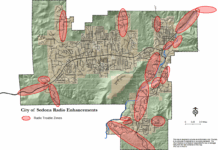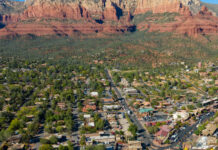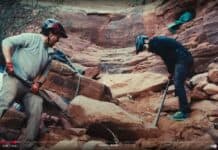City officials representing Sedona in the hopes of receiving federal funding are calling a recent trip to Washington, D.C., a success.
“I think it was successful,” Interim City Manager Alison Zelms said. “We made good contacts.”
Zelms and Mayor Rob Adams traveled to the nation’s capitol Feb. 3 to Feb. 5, to meet with the city’s lobbyist and Arizona politicians.
The city asked for $15,272,600 for three projects from two bills and should know by December if it’s receiving any funds, Zelms said.
In November, Sedona City Council approved $60,000 so Marino Consulting could lobby for the city another year.
In December, City Council voted 6-0 to send three projects out for federal funding — two transportation projects on Highway 89A and Brewer/Ranger Road area and upgrades at the city’s Wastewater Treatment Plant.
On Feb. 4, Adams and Zelms met with U.S. Rep. Ann Kirkpatrick [D-District 1], who once served as Sedona’s city attorney.
They also met with chief of staff for U.S. Sen. Jon Kyl [R-Ariz.].
“I found that if you don’t ask for money, you’re not going to get it,” Adams said. “Second of all, you need to be proactive at all government levels.”
As mayor, Adams started making contacts with local mayors, then county people and then state representatives, he said, “to get on a one-on-one basis and get Sedona on the radar.”
The city’s lobbyist, Michelle Marino, prepped the Sedonans on what to expect for congressional meetings — interruptions, meetings in hallways, initial lack of interest, neutral reaction and 15 minutes.
“Your No. 1 interest likely will not be their No. 1 interest,” the list read.
But the meetings with D.C. politicians lasted longer than expected, Adams said.
“They were really busy and they gave us more time,” he said. “They were engaged so the lobbyist was impressed with that.”
Marino sets up all the meetings and makes the contacts in D.C., Zelms said. She also prepared a summary of the projects, a budget document, letters of support and legislative precedents.
Marino is especially helpful in guiding the city on where they should go to ask for money, according to Zelms.
“We were able to look at projects we have that fit in the parameters,” she said. “And we don’t bring competing projects, so we’re not competing against ourselves.”
This is a good year to test lobbying efforts, Adams said.
“It’s an election year, so get out there and introduce yourself to the new congressmen,” he said.
Highway 89A Enhancements
The city requested $3,900,000 for Highway 89A pedestrian safety and streetscape enhancements, such as medians, utility work, safety improvements at intersections, land acquisition and construction.
The total project cost is $4,875,000 and the city will be responsible to cover the difference.
Ranger/Brewer Road Improvements
The city asked for $3,380,000 in federal funds for improvements in the Brewer/Ranger road area to match the improvements along Highway 179.
The total cost of the project is $4,225,000.
The money could go toward providing bike lanes on both sides of the roads, raised medians and intersection improvements such as roundabouts or traffic signals.
The funds would also go toward improving drainage diversion and re-grading at the intersection.
Wastewater Treatment Plant Upgrades
To upgrade effluent at the city’s Wastewater Treatment Plant, the city requested $7,992,600 in federal funding, for a $14,532,000 project.
The money would go to treat 1 to 2 million gallons per day of wastewater to an A+ level. The highly treated effluent could be used for a number of reuse options that it currently isn’t qualified for.
As the city increases the capacity at the Wastewater Treatment Plant, it will be harder to dispose of effluent with the options it has available now, Zelms said, so by treating the water to a higher standard, it opens up more options for the city to dispose of it.





















